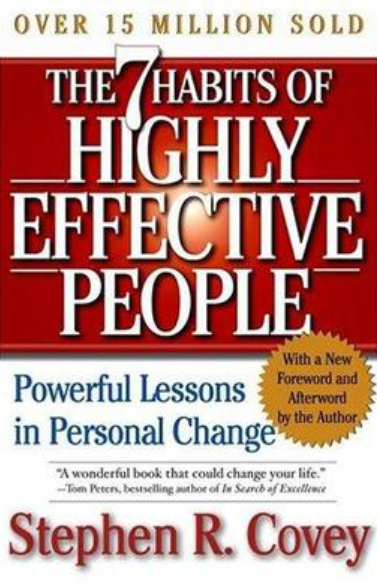The 7 Habits of Highly Effective People, most commonly known as 7 habits, was Stephen Covey’s life’s work. 7 Habits. with millions of copies sold, is one of the top five most well-known and effective books in the self-help genre. Whether reading it cover to cover, indexing or returning to the book every now and then, this 1989 classic clearly explains the step-by-step formula to becoming a successful person.
The 7 Habits of Highly Effective People Summary
Covey’s book is a guide that is 25 years in the making. 7 Habits reaches so wide, that Covey’s family revised and added additional praise and materials following Covey’s passing.
During his years, Covey noticed through his dealings with highly successful business leaders, scholars and those with successful marriages, that successful people often felt an emptiness in their life. Naturally, he needed to understand why. Reading manifestos, scholarly articles and psychology books of the past 200 years he found something interesting.

Covey grouped happiness and success together and found a stark difference between “Character” ethics and “Personality” ethics. A major turning point in the course of humanity was the first world war, and the success was defined differently during and before that period. These character ethics are often attributes of heroes and warriors, such as integrity, courage, loyalty, and humbleness.
However, with rapid technological advances and societal changes, social and public image, behavior, politics and mastery of multiple job-related skills make up our “Personality” value ladder. Covey stipulates that a return to these more primal and effective human characteristics that define our character, make us feel more connected with each other and more fulfilled in our lives.
Best Ideas and Habits from the The 7 Habits of Highly Effective People
Although Covey writes about 7 habits, we will go over 3 of the most memorable and impactful. Principle 1. Proactivity Principle 4. Think Win/Win and Principle number 5, which is Covey’s famous immortalized words “Seek first to understand, and then to be understood”
Be Proactive
There is a very well-known saying that life is 10% reaction and 90% action. because of the way society is structured, we are usually taught in school to follow orders, wait for instructions and punished when we act outside of what we are told. Masked as a way to discipline children, it really prepares most of us for jobs as workers. We clock in where and when we are told, we perform our job description and deliver only the tasks that are assigned to us.
In this way, most of us wait for life to happen, instead of going out to make it happen. Being proactive does not mean only taking initiative in conversations and tasks, but also to take control of your life. I highly believe habit number 1 is the most important building block, when we start to think for ourselves and learn that life is only what we make it, and that no one will knock on our door to build our life for us, then we can change and be successful.
Covey suggests taking a 30 day proactivity test, where you do not complain, take ownership of situations, accept external factors but do not be broken by them, and not play the victim. By committing to growth, personal development and self-improvement you will be successful by extension.
Think Win/Win
Heard of the “win/win” tactic? chance are you have. However, Covey explains that this should not be used as a tactic, but rather a philosophy. Where win/win is mostly thought of as a technique to make a sale or to gain the upper hand in a negotiation, it is actually a human truth that when we achieve win/win scenarios, society and humankind as a whole grows, benefits and passes it forward. This section has 4 traits: 1. Self-Will 2. Imagination 3. Independent awareness and 4. Conscience
Using these 4 traits, you can execute and embrace the 5 dimensions of a win/win situation.
- Character: The first step is always the fundamental building block, and have a winning state of mind is key. A mentality of abundance is crucial, as most human instinct is to hoard scarce items and resources to provide. Understand where someone is coming from, and knowing there are enough resources (i.e. money) to go around at present and at future will ensure a successful mindset.
- Relationships: Genuine and sincere relationships need to be cultivated and nurtured. As mentioned above, knowing there is enough to go around, and that more will come later as well will put you into a proper mindset to negotiate and have good beginnings to a relationship
- Agreement: A simple but crucial step, everyone must agree, and you must re-iterate and confirm with the other party that they understand what they are getting, and what they are giving in return.
- Win/Win performance and support: After agreement, regular contact with the other parties involved need to be maintained. Create a way to measure success, and to stay on task and on track.
- Win/Win processes: Ongoing solutions to new and recurring problems must be win/win and nurtured in an atmosphere with this mindset
Seek First to Understand, Then to Be Understood
Summarizing this book in a few paragraphs is an extremely difficult tasks, and yet, if there is only one habit that should be learned and understood its the above principle. Covey’s famous quote and section has had the most impact on reader’s lives even where the other 6 habits are ignored. No one wants to buy, but everyone wants to sell.. Listen to the other parties. Let them explain their story, and if closed off, ask further questions on their passions, desires and outcome. Do not just listen to reply, listen to understand.
Through the lens of empathy, we are able to understand where the person is coming from, what they’re going through, and what they want most. A conversation, deal, or negotiation should never feel like someone is trying to get the upper hand. Once you feel the other person has properly expressed themselves and has been understood, explain your ideas, make them understand your point of view, and communicate your win/win scenario.
7 Habits Of Highly Effective People: Review + Should I Read this book?
A wonderfully simple, yet complex book, it strives to explain topics and answers the biggest questions we have, such as: “How can I be happy?”, “How can I be successful?” and “How do I give my life meaning?”. Covey has been criticized in his use of “buzzwords” to explain concepts, and uses formulas such as P/PC balance to explain intangible feeing and habits, it is worth noting that this is done to illustrate difficult to imagine internal mechanisms.
It is not uncommon for many readers of this book to go through it twice, three times and even to refer back to it after a few years. Depending on our teachings and core values, some concepts are difficult to understand, yet they are very simple laid out. The “buzzwords” you encounter are nothing man than a memory trick, used to remember a habit and stick with it during conversation and interaction.
In conclusion, remember to always “Seek first to understand, then to be understood”, Think “win/win” and to take charge of your life, and you have already surpassed most in the journey of success and happiness.

